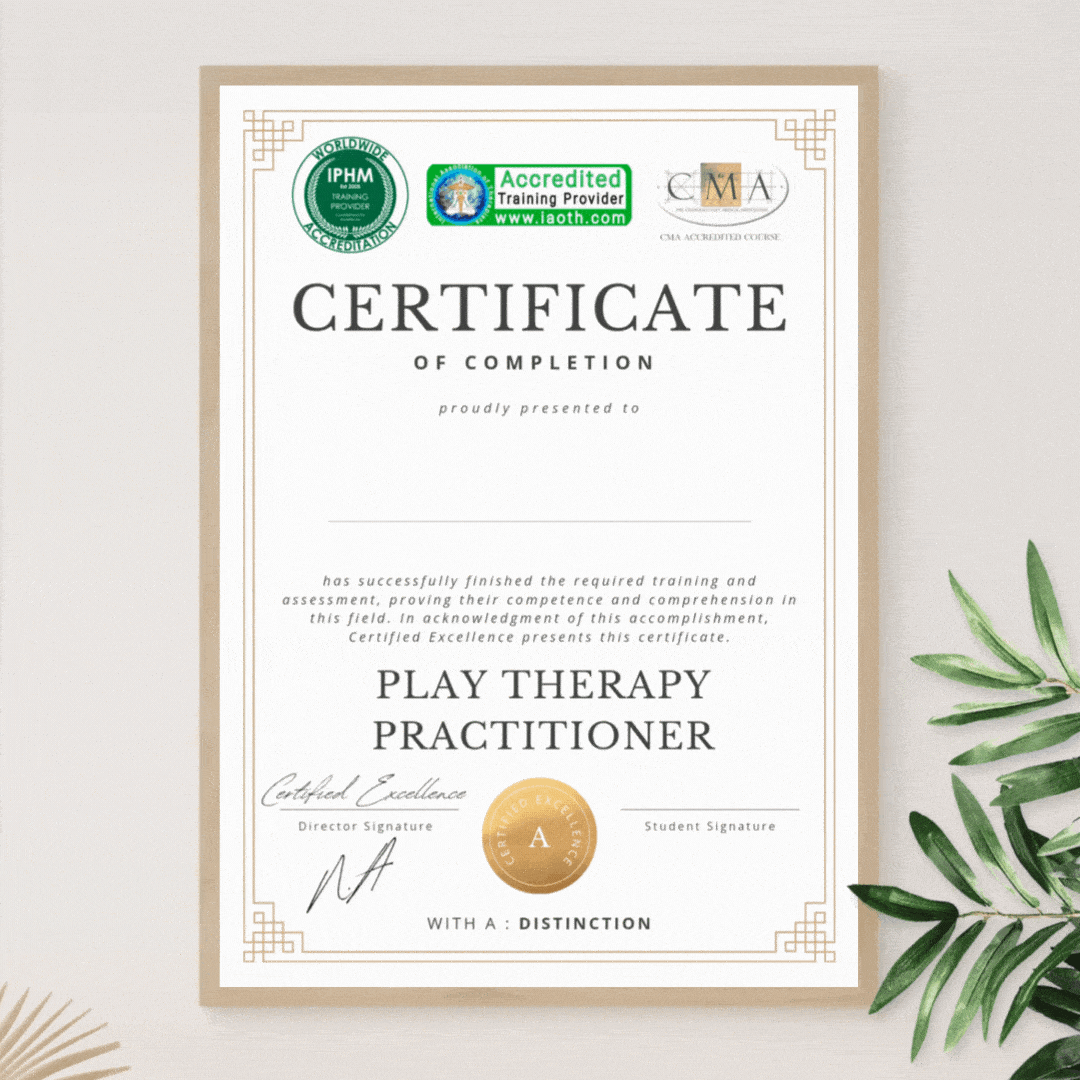
How to Become a Play Therapy Training Expert: A Guide
Are you passionate about helping children heal and grow through creative expression? Play therapy might be the perfect path for you.
Imagine guiding children through their emotions using toys, games, and art, and watching them transform right before your eyes. But how do you become a play therapy training expert? The journey is not only rewarding but also fascinating, filled with opportunities to learn and grow professionally.
You’ll discover the steps you need to take to become a play therapy training specialist. Get ready to unlock your potential and make a real difference in the lives of children. Let’s dive into what it takes to start your journey in play therapy training.

Pathway To Expertise
Embarking on the pathway to expertise in play therapy can be rewarding. This journey involves gaining the right education and relevant experience. These are essential for becoming a proficient play therapy trainer.
Educational Requirements
Start with a degree in psychology, social work, or a related field. This foundational knowledge is crucial for understanding child psychology. Pursue a master’s degree or higher in play therapy or counseling. Accredited programs provide specialized courses in therapeutic play techniques. Certification through recognized bodies enhances credibility. Programs like the Association for Play Therapy offer certification paths. Continuing education is vital. Stay updated with new practices and research in the field.
Relevant Experience
Hands-on experience is key in becoming an effective play therapy trainer. Gain experience by working with children in clinical settings. Volunteering in schools or community centers can provide practical insights. Supervised clinical hours are often required for certification. This experience helps in understanding the nuances of play therapy. Workshops and seminars offer additional learning opportunities. Networking with seasoned professionals can provide valuable mentorship. Build relationships within the therapy community to grow your expertise.
Core Skills And Competencies
Becoming a play therapist requires specific skills and competencies. These core skills are essential for effective practice in play therapy. They help build trust and understanding with children. They also enable therapists to guide children through emotional and behavioral challenges.
Interpersonal Skills
Strong interpersonal skills are vital in play therapy. They help therapists connect with children. Empathy is crucial. It allows therapists to understand a child’s feelings. Active listening is another key skill. It involves truly hearing what a child says. This can be verbal or non-verbal. Patience is also important. Some children may take time to open up. Building rapport creates a safe environment for children to express themselves.
Therapeutic Techniques
Therapists use various techniques to engage children. Play therapy often involves creative activities. These activities help children express their emotions. Techniques can include storytelling and role-playing. Art and music can also be used. Each technique has a specific purpose. They help children process feelings and experiences. Choosing the right technique depends on the child’s needs.
Child Development Knowledge
Understanding child development is essential. It helps therapists know what behaviors are typical. This knowledge guides how therapy is approached. Therapists must recognize developmental milestones. They should understand how these affect behavior. Awareness of cognitive and emotional growth is critical. It aids in tailoring therapy to each child’s stage. This ensures effective support and progress.
Certification And Licensing
Becoming a certified play therapist requires specialized training and licensing. Start by enrolling in accredited play therapy programs. Then, complete supervised clinical hours and pass licensing exams to demonstrate your expertise.
Becoming a play therapy professional is a fulfilling journey. To effectively guide children through their emotional and psychological challenges, it’s essential to have the right certification and licensing. This ensures you are equipped with the skills and knowledge necessary to make a difference. But how do you navigate this path? Understanding the certification programs and licensing requirements is key.
Recognized Certification Programs
Choosing the right certification program can shape your career in play therapy. Look for programs recognized by reputable organizations like the Association for Play Therapy (APT). They offer comprehensive training that covers essential techniques and ethical practices. Consider attending workshops and seminars to gain practical experience. These often provide opportunities to interact with experienced therapists and learn firsthand. Engaging with peers can enrich your understanding and boost your confidence. Many programs offer flexible learning options, from online courses to weekend sessions. This flexibility allows you to balance your training with other commitments. How can you integrate this into your current lifestyle?
State Licensing Requirements
State licensing is crucial for practicing play therapy legally. Each state has unique requirements, so it’s important to research the specifics for your location. This might include a certain number of supervised hours or passing a licensure exam. Some states require you to hold a master’s degree in counseling or a related field. Others might have additional stipulations, such as continuing education credits. Understanding these prerequisites early on can save you time and effort. Reach out to your state’s licensing board for detailed information. They can provide guidance on the necessary steps and paperwork. Have you checked what your state requires? — Becoming a play therapy professional is not just about acquiring knowledge; it’s about ensuring you meet the certification and licensing standards. This foundation empowers you to make a genuine impact on the lives of children and their families.
Advanced Training Opportunities
Advanced training opportunities in play therapy help deepen your skills. They offer specialized knowledge and techniques. These opportunities are ideal for those seeking to enhance their practice. They provide a platform to explore new concepts and methods. Engaging in advanced training can significantly improve your therapeutic approach. It allows you to learn from experts and peers. This section explores workshops, seminars, and continuing education courses. Each avenue offers unique benefits and insights.
Workshops And Seminars
Workshops and seminars offer hands-on learning experiences. They focus on specific techniques and strategies. In these settings, you engage directly with knowledgeable instructors. You gain practical insights through live demonstrations. Small group interactions provide personalized attention. This fosters a deeper understanding of complex topics. Workshops often include role-playing activities. These help in applying what you’ve learned to real scenarios. Seminars cover broader topics and current trends. They are a great way to stay updated in the field.
Continuing Education Courses
Continuing education courses are crucial for professional growth. They provide structured learning over a longer period. These courses often lead to certifications or advanced credentials. They cover in-depth theoretical and practical aspects. Online courses offer flexibility and convenience. They allow you to learn at your own pace. Interactive modules and assessments enhance your comprehension. These courses focus on new research and methodologies. They ensure you are equipped with the latest skills. Continuing education helps maintain your competence and confidence.
Building A Professional Network
Connecting with experienced play therapists can enhance your training journey. Attend workshops and seminars to meet professionals in the field. Engage in online forums and social media groups to share insights and gain valuable advice.
Building a professional network is vital for play therapy training. It opens doors to valuable resources and opportunities. Connecting with peers and experts enhances your skills and knowledge. A strong network supports career growth and enriches your practice.
Joining Professional Associations
Professional associations offer a great platform for networking. Membership connects you with fellow professionals in play therapy. These associations often host events and workshops. Attend these gatherings to meet like-minded individuals. They provide opportunities to learn from experienced therapists. Staying active in these groups fosters meaningful connections.
Mentorship And Collaboration
Seek mentorship from seasoned play therapists. A mentor provides guidance and insight into the field. Collaborative projects build relationships and develop new skills. Working with others broadens your perspective. It enhances your problem-solving abilities. Partnering on research or case studies can be beneficial. It opens new avenues for learning and growth.

Career Development Strategies
Embarking on a career in play therapy is a journey filled with opportunities for growth and development. To truly thrive in this field, it’s essential to focus on career development strategies that not only enhance your skills but also elevate your professional standing. By actively seeking out practical experiences and considering specialization in niche areas, you can carve a unique path for yourself in the world of play therapy.
Gaining Practical Experience
Practical experience is the cornerstone of effective play therapy practice. Start by volunteering at local community centers or schools. These environments provide real-world situations where you can apply your theoretical knowledge.
Consider shadowing experienced therapists. Observing their sessions can offer invaluable insights into client interactions and therapy techniques.
Engage in role-playing exercises with peers. Practicing different scenarios helps refine your skills and boosts your confidence in handling diverse cases.
How are you actively seeking out opportunities to practice your skills? Reflect on the areas where you need more hands-on experience and pursue them relentlessly.
Specializing In Niche Areas
Choosing to specialize in niche areas can significantly enhance your career prospects. Think about focusing on trauma-informed play therapy or working with children with autism.
Attending specialized workshops or courses can deepen your knowledge. These events often provide cutting-edge techniques tailored to specific client needs.
Building expertise in a niche area sets you apart from other practitioners. It positions you as a go-to expert in your chosen field.
What niche area excites you? Explore your interests and consider how they can be integrated into your professional journey.
Ultimately, your career development in play therapy hinges on your willingness to learn, adapt, and innovate. By gaining practical experience and specializing in niche areas, you can build a fulfilling and impactful career.
Challenges And Solutions
Embarking on a journey to become a play therapy trainer presents unique challenges. Aspiring trainers often face hurdles that can seem daunting. Yet, with the right approach, these obstacles can be navigated effectively. Understanding common challenges and implementing solutions is crucial for success.
Common Obstacles
Many find the learning curve steep. Grasping therapeutic techniques can be difficult. Balancing theory with practical application poses challenges. Time management often becomes a struggle. Some experience hesitation in handling diverse child behaviors. Gaining accreditation may seem overwhelming. Networking with experienced professionals can be intimidating. Access to resources might be limited.
Effective Problem-solving Strategies
Break down complex theories into simple parts. Practice consistently to build skills. Prioritize tasks to manage time effectively. Seek mentorship from seasoned trainers. Engage in workshops to gain hands-on experience. Collaborate with peers to share insights. Use online platforms to access materials. Set realistic goals to maintain motivation.
Identify specific areas needing improvement. Develop a structured learning plan. Utilize feedback from training sessions. Adapt techniques to suit different child needs. Join professional groups for networking. Regularly evaluate your progress.
Future Trends In Play Therapy
Play therapy is evolving rapidly. New trends are shaping its future. Experts are exploring fresh methods to enhance its effectiveness. These trends are pivotal for those pursuing play therapy training. Understanding them helps therapists stay ahead and provide better care.
Technological Advancements
Technology is influencing play therapy. Virtual reality tools are emerging. These tools offer new ways for children to express emotions. They allow therapists to observe behavior in controlled settings. Apps designed for therapeutic play are gaining popularity. They engage children through interactive games and activities.
Online platforms offer training for aspiring play therapists. They provide access to resources and expert guidance. This makes training more accessible and flexible. Video conferencing tools enable remote therapy sessions. This expands the reach of play therapy to more children.
Evolving Therapeutic Practices
Therapeutic practices in play therapy are evolving. There’s a shift towards trauma-informed approaches. These methods consider the impact of trauma on children. Therapists use play to help children process their experiences.
Incorporating mindfulness into play therapy is becoming common. It helps children develop self-awareness and emotional regulation. Therapists are also blending different therapy models. This holistic approach enhances the effectiveness of treatment.
Frequently Asked Questions
What Qualifications Are Needed For Play Therapy Training?
To pursue play therapy training, a degree in psychology, counseling, or social work is typically required. Many programs also require a relevant master’s degree. Additionally, experience working with children is often necessary. Specific certifications, like Registered Play Therapist (RPT), may be pursued after completing required training hours and supervision.
How Long Does Play Therapy Training Take?
Play therapy training duration varies based on the program and level of certification. Generally, it involves completing a master’s degree, followed by specialized training. This can take several years, including practicum and supervision hours. Continuous professional development is also required to maintain certification in the field.
What Is The Cost Of Play Therapy Training?
The cost of play therapy training can vary widely. It typically includes tuition fees for a relevant degree program, additional certification courses, and supervision fees. Scholarships, grants, or financial aid might be available to help offset these costs. Prospective students should research specific programs for detailed cost information.
Can I Do Play Therapy Training Online?
Yes, many institutions offer online play therapy training programs. These programs provide flexible learning options for students. Online programs often include virtual classes, assignments, and supervised practice. However, some in-person training may still be required for hands-on experience with children.
Conclusion
Becoming a play therapy trainer is a rewarding journey. It requires dedication, patience, and ongoing learning. Start by gaining experience in play therapy practice. Then, pursue relevant certifications and training programs. Connect with fellow professionals for guidance and support. Stay updated with the latest research and techniques.
This ensures your skills remain sharp. Remember, every step brings you closer to helping others heal. With commitment, you can make a real difference. So, take the first step today. The world of play therapy awaits your passion and expertise.




